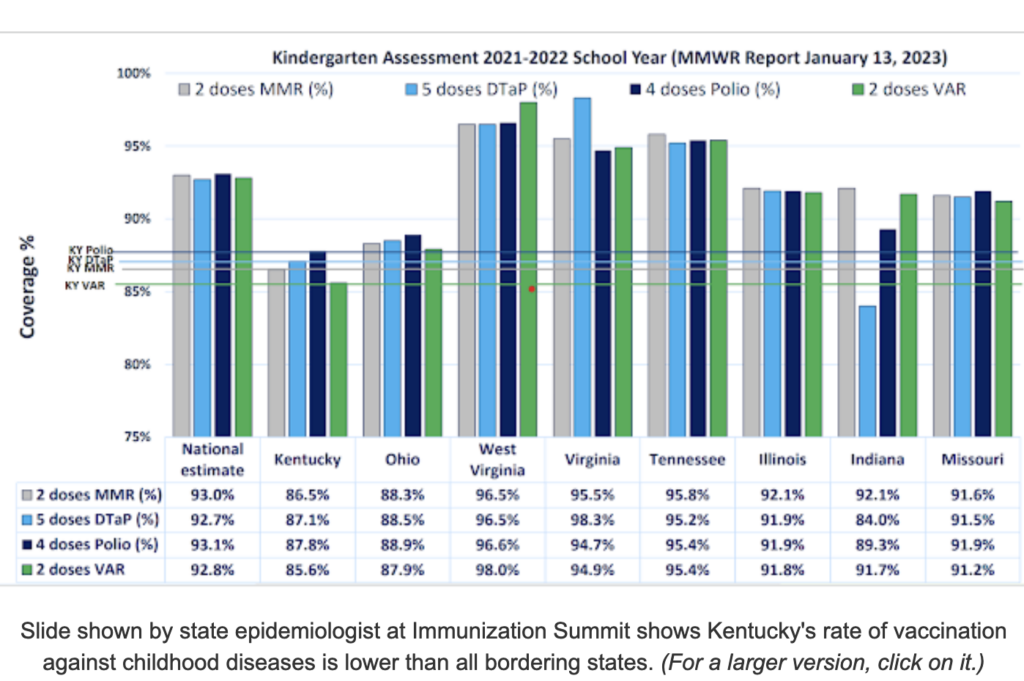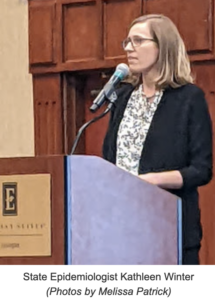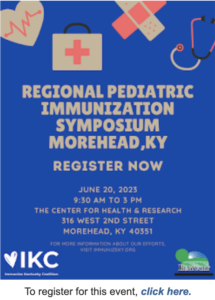Ky. kids still aren’t as immunized as they were before pandemic; pertussis threat rises; cancer-preventing vaccine rates still low

By Melissa Patrick
Kentucky Health News
 The Immunize Kentucky Coalition‘s Immunization Summit, held May 10 in Lexington, opened with a warning that Kentucky’s children fell behind on their immunizations during the pandemic and still haven’t caught up.
The Immunize Kentucky Coalition‘s Immunization Summit, held May 10 in Lexington, opened with a warning that Kentucky’s children fell behind on their immunizations during the pandemic and still haven’t caught up.
Citing 2021-22 school immunization data, State Epidemiologist Kathleen Winter said Kentucky is behind all its bordering states in routine childhood vaccination rates and is well below the national average.
The greatest concern right now is kindergartners, she said, because their measles-mumps-rubella vaccination rate has dropped in the last two school years. (MMR rates among seventh and 11th-graders remained about the same, but that’s no surprise, since two doses of the vaccine are recommended before a child turns 6.)
“We really need to focus on this particular age group that maybe has missed vaccines . . . because of the pandemic,” Winter said.
Winter said Kentucky’s kindergarten two-dose MMR rate of 86.5% ranks in the bottom five states nationally. The national rate is 93.5%. The National Immunization Survey by the Centers for Disease Control and Prevention, which runs behind school data, shows that Kentucky’s decline in immunization is similar to a national decline.
Regular well-child visits help parents and health-care providers keep children current on immunizations. Winter said one study found that 41% of Kentucky parents of children 12 and younger reported their child had missed a well-child visit during the pandemic. This rate was even higher among Hispanics (48%).
“We’re getting back on track with routine visits now, but we still have not caught up for where we had this big decline during the pandemic months,” Winter said.
Winter said there are “dramatic differences” in immunization rates between those who have private health insurance, publicly paid insurance, and those who are uninsured.
“There’s some real work to be done with these vulnerable populations, not just here in Kentucky, but nationwide,” Winter said.
Pertussis concerns
Since 2018, fewer Kentucky children have received the DTap or Tdap vaccines, which protect against tetanus, diphtheria and pertussis (whooping cough). Rates among kindergarteners and 11th graders have been “pretty stable,” but there has been a steady decline among seventh graders since 2018, with rates between 80% and 85%, Winter said.
The United States has a spike in pertussis about every five years, Winter said, noting there was a “major epidemic” in 2012 and “We are well positioned to have another one.”
She added, “We are concerned about this in particular because we have had outbreaks of pertussis reported this year; several counties have already noticed outbreaks. . . . So this is the time we really need to focus on getting kids vaccinated for pertussis.”
Cancer-prevention vaccine rates are low
According to the CDC, human papillomavirus (HPV) is a very common virus that can cause cancer — and the HPV vaccine can prevent more than 90% of cancers caused by it, including cervical cancer. But only 57% of Kentucky teens have taken it.
“Kentucky is another state that really needs to be worried about HPV,” Winter said. “We have some of the highest rates of cervical cancer here in Kentucky.”
Even more concerning, said Winter, is that fewer than half Kentucky females are up-to-date on HPV vaccines and two-thirds of them haven’t gotten a single dose of the vaccine, which is given in a three-dose series. Kentucky ranks 37th among the states for this measure.
HPV can also cause cancers of the vagina, vulva, penis, anus, rectum, throat and the back of the tongue. The CDC reports that each year, about 47,199 new cases of cancer are found in parts of the body where HPV is often found. Of those, about 37,300 of them are caused by HPV.
Covid-19 vaccines still available and free
Winter noted that the end of the national public-health emergency for Covid-19 means that getting Kentuckians vaccinated against the disease has become normalized.
And because the now single-dose bivalent vaccine is recommended for everyone 6 months and older, Winter said it needs to be considered a routine childhood vaccination.
“We have to routinize it in every way possible, routinize it for our conversations with parents and for routine childhood visits, getting it incorporated fully into the childhood schedule,” she said.
That’s not not being done yet, the data shows.
“When we look specifically at children, 94% of those under the age of 5 have never been vaccinated against Covid and 74% of children in the 5- to 11-year age group have never been vaccinated,” Winter said. “So we are still not making this routine for children. It’s not being offered and provided in the settings that it needs to be offered and provided.”
Winter also stressed that Covid-19 vaccines are still readily available and free, even though the commercialization of the vaccine is expected to come in late summer or fall.
“This is why we need to work now to get this routinized as much as we can into clinics and settings where people are routinely getting vaccinated,” she said.
She added that the latest guidance is for people 65 and older to get an additional booster and that guidance for everyone else is likely coming.
Vaccinations work
Winter said the measles exposure that thousands of people had in February at the spontaneous revival at Asbury University in Wilmore turned out to be a public-health success story.
An unvaccinated Jessamine County resident who attended the revival in Februrary had Kentucky’s third reported case of measles in three months, but Winter said there has not been one secondary measles case from that exposure. She noted that the person with measles wore a surgical-type mask at “a lot” of the events.
“The reality is, most people are immune to measles,” Winter said. “Most people are fully vaccinated or had measles as a child. So we do not have this crisis of a population-level issue. What we have are targeted individuals and ages where we need to get back on track. So, this is where we need to focus.”
 Even with this public-health victory, Winter cautioned that without a high level of population immunity, the potential for a super-spreading event would remain.
Even with this public-health victory, Winter cautioned that without a high level of population immunity, the potential for a super-spreading event would remain.
Organizers of the summit hope it will be an annual event. Amber Malott, chair of the Immunize Kentucky Coalition, which is part of the Kentucky Rural Health Association, said its mission is to “create equitable access to vaccinations across the commonwealth.” As part of that mission, she said they will hold free pediatric immunization symposiums in Morehead June 20 and Owensboro June 29.